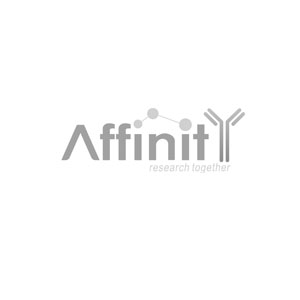Phospho-GATA3 (Ser369) Antibody - #AF7271
| Product: | Phospho-GATA3 (Ser369) Antibody |
| Catalog: | AF7271 |
| Description: | Rabbit polyclonal antibody to Phospho-GATA3 (Ser369) |
| Application: | WB IF/ICC |
| Reactivity: | Human, Mouse |
| Prediction: | Pig, Zebrafish, Bovine, Horse, Sheep, Rabbit, Dog, Chicken, Xenopus |
| Mol.Wt.: | 48kDa; 48kD(Calculated). |
| Uniprot: | P23771 |
| RRID: | AB_2843711 |
Product Info
*The optimal dilutions should be determined by the end user.
*Tips:
WB: For western blot detection of denatured protein samples. IHC: For immunohistochemical detection of paraffin sections (IHC-p) or frozen sections (IHC-f) of tissue samples. IF/ICC: For immunofluorescence detection of cell samples. ELISA(peptide): For ELISA detection of antigenic peptide.
Cite Format: Affinity Biosciences Cat# AF7271, RRID:AB_2843711.
Fold/Unfold
GATA 3; GATA binding factor 3; GATA binding protein 3; GATA-binding factor 3; Gata3; GATA3_HUMAN; HDR; HDRS; MGC2346; MGC5199; MGC5445; Trans acting T cell specific transcription factor GATA 3; Trans-acting T-cell-specific transcription factor GATA-3;
Immunogens
- P23771 GATA3_HUMAN:
- Protein BLAST With
- NCBI/
- ExPASy/
- Uniprot
MEVTADQPRWVSHHHPAVLNGQHPDTHHPGLSHSYMDAAQYPLPEEVDVLFNIDGQGNHVPPYYGNSVRATVQRYPPTHHGSQVCRPPLLHGSLPWLDGGKALGSHHTASPWNLSPFSKTSIHHGSPGPLSVYPPASSSSLSGGHASPHLFTFPPTPPKDVSPDPSLSTPGSAGSARQDEKECLKYQVPLPDSMKLESSHSRGSMTALGGASSSTHHPITTYPPYVPEYSSGLFPPSSLLGGSPTGFGCKSRPKARSSTGRECVNCGATSTPLWRRDGTGHYLCNACGLYHKMNGQNRPLIKPKRRLSAARRAGTSCANCQTTTTTLWRRNANGDPVCNACGLYYKLHNINRPLTMKKEGIQTRNRKMSSKSKKCKKVHDSLEDFPKNSSFNPAALSRHMSSLSHISPFSHSSHMLTTPTPMHPPSSLSFGPHHPSSMVTAMG
Predictions
Score>80(red) has high confidence and is suggested to be used for WB detection. *The prediction model is mainly based on the alignment of immunogen sequences, the results are for reference only, not as the basis of quality assurance.
High(score>80) Medium(80>score>50) Low(score<50) No confidence
PTMs - P23771 As Substrate
| Site | PTM Type | Enzyme | Source |
|---|---|---|---|
| Ubiquitination | Uniprot | ||
| S110 | Phosphorylation | Uniprot | |
| S115 | Phosphorylation | Uniprot | |
| T156 | Phosphorylation | P24941 (CDK2) | Uniprot |
| S162 | Phosphorylation | Uniprot | |
| S166 | Phosphorylation | Uniprot | |
| S172 | Phosphorylation | Uniprot | |
| Y186 | Phosphorylation | Uniprot | |
| K195 | Ubiquitination | Uniprot | |
| R261 | Methylation | Uniprot | |
| T271 | Phosphorylation | Uniprot | |
| Y282 | Phosphorylation | Uniprot | |
| Y290 | Phosphorylation | Uniprot | |
| K292 | Acetylation | Uniprot | |
| K304 | Acetylation | Uniprot | |
| S308 | Phosphorylation | P17612 (PRKACA) | Uniprot |
| T315 | Phosphorylation | Uniprot | |
| S316 | Phosphorylation | Uniprot | |
| Y344 | Phosphorylation | Uniprot | |
| K346 | Acetylation | Uniprot | |
| S369 | Phosphorylation | Uniprot | |
| K371 | Acetylation | Uniprot | |
| K373 | Acetylation | Uniprot | |
| K374 | Acetylation | Uniprot | |
| K376 | Acetylation | Uniprot | |
| K377 | Ubiquitination | Uniprot | |
| S381 | Phosphorylation | Uniprot |
Research Backgrounds
Transcriptional activator which binds to the enhancer of the T-cell receptor alpha and delta genes. Binds to the consensus sequence 5'-AGATAG-3'. Required for the T-helper 2 (Th2) differentiation process following immune and inflammatory responses.
Nucleus.
T-cells and endothelial cells.
Interacts with TBX21 ('Tyr-530' phosphorylated form).
Binds DNA via the 2 GATA-type zinc fingers. Each zinc finger may bind either adjacent sites in a palindromic motif, or a different DNA molecule allowing looping and long-range gene regulation.
The YxKxHxxxRP motif is critical for DNA-binding and function.
Research Fields
· Human Diseases > Immune diseases > Inflammatory bowel disease (IBD).
· Organismal Systems > Immune system > Th1 and Th2 cell differentiation. (View pathway)
· Organismal Systems > Immune system > Th17 cell differentiation. (View pathway)
Restrictive clause
Affinity Biosciences tests all products strictly. Citations are provided as a resource for additional applications that have not been validated by Affinity Biosciences. Please choose the appropriate format for each application and consult Materials and Methods sections for additional details about the use of any product in these publications.
For Research Use Only.
Not for use in diagnostic or therapeutic procedures. Not for resale. Not for distribution without written consent. Affinity Biosciences will not be held responsible for patent infringement or other violations that may occur with the use of our products. Affinity Biosciences, Affinity Biosciences Logo and all other trademarks are the property of Affinity Biosciences LTD.
